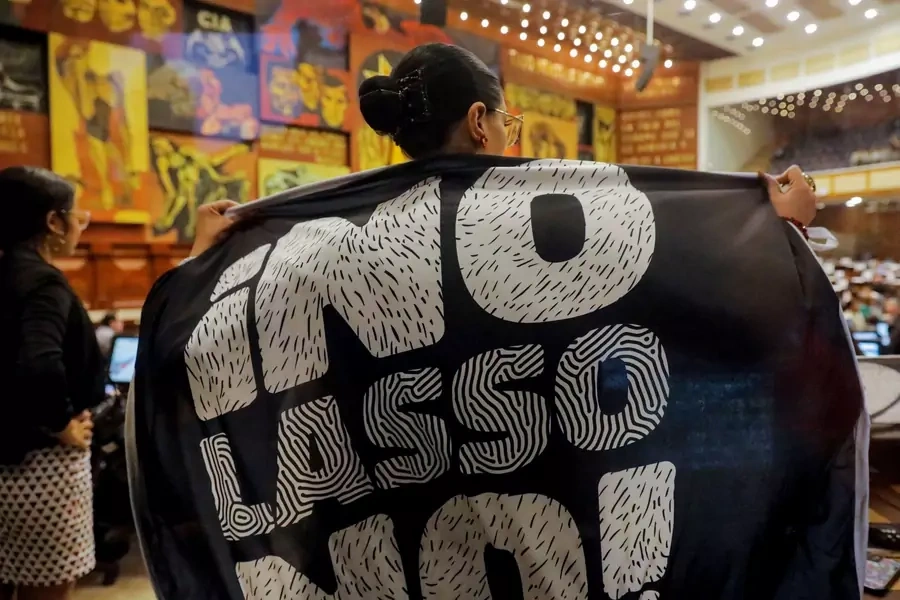Crisis in Quito: President Guillermo Lasso Heads to Impeachment Vote

If you walk the streets of Quito—Ecuador’s sprawling, mountainous capital—it won’t take you long to spot evidence of the country’s polarized divide.
Brightly colored graffiti gives you diametrically opposed answers as to who is to blame for Ecuadorians’ compounding misfortunes: a moribund economy; a murder rate which last year soared to surpass Mexico’s, and a migration wave that has seen 30,000 Ecuadorians cross Panamá’s Darién gap in 2022 alone—second only to the number of Venezuelans making the same dangerous trek.
More on:
“Punish Lasso,” is one common tagline, pinning the blame on the country’s embattled and often hapless conservative president. Guillermo Lasso, a banker who vied unsuccessfully for the presidency for a decade before winning, built his career in a private sector think tank—not the halls of Ecuador’s National Assembly—and it shows. Since taking office nearly two years ago, he has proven unwilling or unable to negotiate his way to a legislative majority—or even assemble a stable governing team. Whatever the quality of his policy proposals, they have rarely made it off the drawing board. Lasso, perceived by many Ecuadorians as inept and out of touch with ordinary people’s struggles, has seen his approval rating has tumbled to 17 percent.
“Iza terrorista, Correa financista,” is another ubiquitous slogan. It takes aim at Leonidas Iza, the hard-left leader of the country’s largest Indigenous organization, and leftist ex-president Rafael Correa, who eroded checks and balances and deepened ties with China and Russia during a decade in office (2007-17). Correa, a charismatic populist who concentrated power in the presidency, fled Ecuador rather than face a conviction for corruption which he claims is baseless. But he still commands the largest bloc of legislators in congress. Correa’s and Iza’s critics see both men as cynical political profiteers who are eager for Lasso to fail—provided his demise springboards the Correísta left back into office. Last year, both leaders encouraged mass protests against deteriorating economic conditions that nearly toppled the Lasso government.
The Impeachment Impasse
Now, Lasso, one of the United States’ closest partners in Latin America, is on the verge of losing office through legal channels.
On May 9, eighty-eight lawmakers in Ecuador’s National Assembly voted to continue with an impeachment process against Lasso which began in March. Now, Lasso could face a final impeachment vote—and the prospect of losing office—within the next two weeks.
The impeachment process originated in a scandal that erupted in January 2023. That month, Ecuadorian journalists denounced members of Lasso’s inner circle for allegedly mismanaging public companies and maintaining ties to Albanian mafia groups that have come to dominate Ecuador’s lucrative cocaine trafficking routes. The journalists say their information came from a police investigation, although Ecuador’s Attorney General has claimed the source material was doctored.
More on:
After the journalists published leaked audio clips corroborating aspects of their story, one top government appointee, Hernan Luque, became a fugitive from justice. Another businessman allegedly connected to the ring, Rubén Cherres, was found murdered. In March, a majority of Ecuador’s National Assembly asked to start impeachment proceedings. Ecuador’s Constitutional Court partially granted the request, allowing a vote on the corruption allegations to move forward.
Lasso’s few allies in the National Assembly called on their peers to halt the process, citing a lack of evidence tying Lasso to the public contracts in question. But evidence—or lack thereof—is unlikely to be the deciding factor when it comes to the assembly’s final vote. The impeachment process became a referendum on Lasso’s leadership weeks ago. It is likely to stay that way.
The impeachment process will culminate with a final vote to be held between May 20 and 22.
A Constitutional Crisis to Come?
Lasso now faces two options.
His first option is to gamble on surviving the final impeachment vote. It takes ninety-two votes—or two thirds of Ecuador’s National Assembly—to impeach a president. Lasso survived an impeachment vote last year by a margin of just two votes. But considering the recent scandals and Ecuador’s soaring crime rates, he is less likely to survive a second attempt at removal. Moreover, internal elections for National Assembly leadership positions—to be held over the next few days—give the Correísta opposition valuable bargaining chips: in return for supporting other parties' candidates for leadership positions, they could demand votes against Lasso.
If Lasso falls, he will be replaced by his vice president, Alfredo Borrero, a little-known doctor who has all but vanished from the public since inauguration day. With a weak president in office, Correa and his legislative bloc would gain tremendous power.
But Lasso has a second option: if he so chooses, before the final impeachment vote he can deploy a never-before-tested constitutional clause—known as muerte cruzada (or “crossed death”)—that would disband the National Assembly and allow him to govern by decree for six months. Then, new general elections would be held. Everything hinges on whether Lasso believes he has enough support in the assembly to survive the final vote.
Publicly, Lasso has ruled out going quietly, the first option, and has said he is willing to apply crossed death. But Correa and Iza have sworn that if Lasso shutters congress, they will call mass protests. Like in 2019 and 2022, protests could once again set Quito ablaze and shut down the country—only this time, with a constitutional crisis thrown into the mix.
Whichever path Lasso chooses, Ecuador is likely headed for a period of increased instability. Given the acute challenges Ecuador is already facing—from surging crime to mass migration to a weak economy—that is something ordinary Ecuadorians can hardly afford.
 Online Store
Online Store